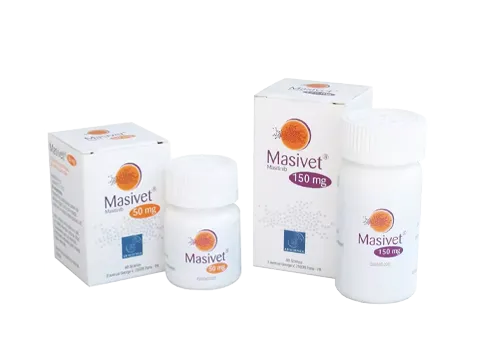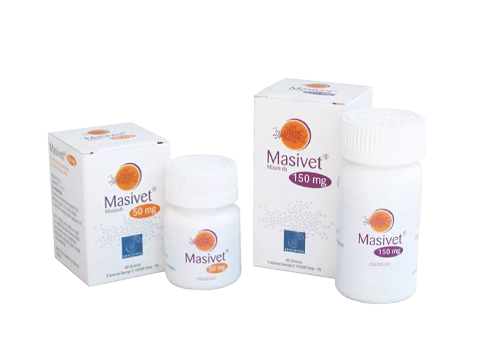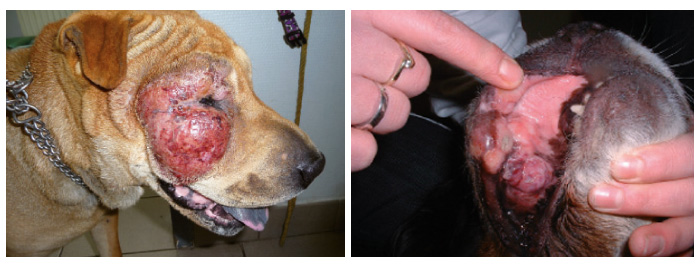
Masivet

Oncology
Masivet
The first antitumor in veterinary medicine. Oral treatment of mastocytomas.
Masivet® is a major innovation in veterinary medicine developed by AB Science, a biopharmaceutical company specialising in the research of tyrosine kinase inhibitor molecules.
Masivet® is marketed in Spain, in collaboration with Urano Vet, a company committed to providing veterinary professionals with innovative, safe and effective products.
MASIVET® 50 MG 30 tablets
- Marketing authorization number: EU/2/08/087/001
- National code: 571530
MASIVET® 150 MG 30 tablets
- Marketing authorization number: EU/2/08/087/002
- National code: 571529
MARKETING AUTHORISATION HOLDER
- AB Science S.A.
- 3 avenue George V 75008
- Paris France
- +33 (0)1 47 20 00 14 +33 (0)1 47 20 24 11
- MASIVET@ab-science.com
Distributor of Masivet® in Spain: URANO VET SL
Information for veterinarians
Mastocyte tumour is the most common malignant skin tumour in dogs, accounting for 16-21% of skin tumours. Its behaviour and progression are quite heterogeneous, ranging from well-differentiated, slow-growing tumours with low metastatic potential to very undifferentiated and aggressive tumours with a high metastatic capacity.
Symptoms of mastocytoma
The appearance of mastocytomas varies from a wart-shaped nodule to a soft subcutaneous mass (like a benign lipoma on palpation) or an ulcerated mass.

Tumour manipulation may cause redness and swelling due to the release of mast cell granules (known as Darier signs), as well as prolonged local bleeding.
In cases of highly malignant tumours, symptoms may include loss of appetite, vomiting, diarrhoea, and anaemia. The presence of these symptoms usually indicates the spread of mast cells throughout the body.
If a large amount of histamine is released at once, ulceration of the stomach and duodenum may occur (in up to 25% of cases) or disseminated intravascular coagulation.
When metastasis occurs, it usually occurs in the liver, spleen, lymph nodes, and bone marrow.
Grades
A biopsy is required to determine the grade of the tumour, which may vary from grade I (with low metastatic potential) to grade III (high metastatic potential).
Grading depends on the degree of mast cell differentiation, mitotic activity, degree of invasiveness, and the presence of inflammation and necrosis.
Mast cells and c-kit receptors
Mast cell tumours are caused by uncontrolled proliferation of neoplastic mast cells. Mast cell proliferation is controlled by the c-kit receptor, which is a tyrosine kinase receptor that controls the physiological activity of mast cells.
c-kit receptors play an essential role not only in tumour growth and the appearance of metastasis but also in certain inflammatory diseases such as atopic dermatitis and asthma.
FAQs
Masivet® contains masitinib, which belongs to a class of drugs that have anti-tumour action. They are available in 50 mg and 150 mg tablets.
The active ingredient in Masivet®, masitinib, is a tyrosine kinase inhibitor, that is, it blocks a specific type of enzyme called tyrosine kinases that are found in the c-kit receptors of cells called mast cells, whose uncontrolled proliferation is the cause of tumours known as mast cell tumours.
By blocking these receptors, Masivet® helps control cell division, preventing tumour growth in this singular mutation.
Numerous studies have been conducted in both laboratory dogs and patients in veterinary clinics, in Europe and the United States. The main studies compare the efficacy of Masivet® at the recommended dose of 12.5 mg/kg of body weight once a day, compared to a placebo (a simulated drug that contains no active ingredient). The studies include dogs of different breeds and sexes with tumours that have recurred after surgery or that could not be surgically removed due to their characteristics or extension.
Masivet® is a much safer medication to administer than traditional chemotherapy. However, some precautions must be taken when administering it:
- The tablets must be administered whole and cannot be divided, broken or crushed.
- If broken tablets, vomit, urine or faeces of dogs treated with Masivet® get in touch with the skin or eyes, rinse immediately with plenty of water.
- Children should not be in close contact with treated dogs, their faeces or vomit.
- If Masivet® is accidentally taken by a person, contact the doctor immediately and show the package insert or label to the doctor.
- Do not eat, drink or smoke while administering the medication.
